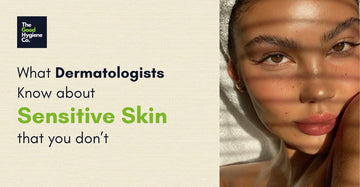Sensitive skin is one of those things we’ve all heard of, and many of us experience it to some degree. Whether it’s redness after applying a new product, a flare-up from environmental changes, or that uncomfortable tightness after a shower, we’ve all been there. But here’s the thing: what most people think they know about sensitive skin might not be the full story. You’ve probably heard that it’s just about allergies or a reaction to harsh ingredients. But what if we told you there’s so much more to it than that? Dermatologists, the experts who deal with skin every day, understand the nuances of sensitive skin in ways most of us don’t. And the truth is, there are factors impacting your skin that you may never have considered—things like your stress levels, hormonal changes, and even your diet. Ready to discover the hidden truths about sensitive skin? Let’s dive into what dermatologists know that you might not!
What Dermatologists Know About ‘Sensitive Skin’
1.Sensitive Skin Is More Than Just an Allergy Response
Many people believe that sensitive skin is simply the result of allergic reactions to skincare products. However, dermatologists recognize that skin sensitivity often goes much deeper than that. It typically involves a compromised skin barrier, the protective outer layer that shields your skin from harmful pollutants, irritants, and bacteria. When this barrier becomes damaged or weakened—whether from harsh weather, skincare routines, or environmental stress—your skin becomes more reactive, leading to irritation, redness, and discomfort. This deeper understanding allows dermatologists to focus not just on alleviating symptoms, but on restoring and strengthening the skin's natural defenses.
2.The Skin’s pH:
You may not realize that your skin's pH plays a crucial role in its sensitivity. Healthy skin has a slightly acidic pH (around 5.5), which is vital for protecting it from harmful microbes and preserving moisture. When the pH balance is disrupted—whether through the use of harsh soaps, over-exfoliation, or environmental changes—the skin becomes more vulnerable to irritation. Dermatologists often recommend using pH-balanced products, as they help maintain this delicate balance and reduce the likelihood of sensitivity flare-ups. It’s a small but crucial detail that can make a big difference in how your skin reacts.
3.Lifestyle Factors Can Play a Major Role
While it’s easy to blame external factors like skincare products for sensitivity, dermatologists know that your lifestyle can have a significant impact. Poor sleep habits, high stress levels, and even a lack of hydration can contribute to inflammation and exacerbate skin sensitivity. In fact, chronic stress is a known trigger for conditions like eczema and rosacea, both of which are marked by heightened skin sensitivity. A balanced lifestyle, rich in sleep, exercise, and stress management, can work wonders for your skin’s resilience. Stress-relief practices like yoga, meditation, or even a relaxing evening walk can help keep your skin calm and in balance.
4.Hormonal Fluctuations:
Hormonal changes—whether due to pregnancy, menopause, or the use of birth control—can significantly affect how your skin reacts to external factors. During times of hormonal fluctuation, the skin may become more sensitive, dry, or prone to breakouts. For example, the drop in estrogen levels during menopause can lead to a thinner skin barrier, making it more susceptible to irritation. Dermatologists understand this intimate connection between hormones and skin health, and they often recommend treatments tailored to address these specific changes. By aligning your skincare routine with your hormonal health, you can better manage skin sensitivity during these transitional phases.
5.Diet: The Role of Inflammation
What you eat can impact the health of your skin more than you think. Dermatologists often emphasize the link between diet and skin sensitivity, particularly when it comes to inflammatory foods. Diets high in sugar, processed foods, and dairy products can promote inflammation in the body, which may manifest as sensitive, irritated skin. On the flip side, a diet rich in anti-inflammatory foods like omega-3 fatty acids (found in fish like salmon), leafy greens, and antioxidants (like berries and nuts) can help soothe and protect sensitive skin. It’s not just about what you put on your skin—it’s about feeding it from the inside out.
6.Fragrance:
Many people don’t realize that fragrance is one of the most common irritants for sensitive skin. Whether natural or synthetic, fragrances can cause allergic reactions or simply aggravate the skin’s already fragile state. Dermatologists often recommend fragrance-free or hypoallergenic skincare products, especially for those with sensitive skin. These products are formulated to reduce the risk of irritation while still delivering effective results. If you have sensitive skin, it’s always wise to check product labels carefully to ensure they don’t contain unnecessary fragrances or harsh additives.
7.Sun Protection:
For individuals with sensitive skin, sun exposure can be one of the most damaging factors. Dermatologists stress the importance of broad-spectrum sunscreen, not just for anti-aging, but as a critical step in protecting sensitive skin from further damage. UV rays can break down the skin’s protective barrier, making it even more vulnerable to irritation. Mineral sunscreens with zinc oxide or titanium dioxide are often recommended for sensitive skin because they physically block UV rays and are less likely to cause irritation compared to chemical sunscreens. Protecting your skin from the sun isn’t just a matter of beauty—it’s a vital part of keeping sensitive skin safe and healthy.
8.Topical Treatments That Help Restore Balance
When dealing with sensitive skin, less is often more. Overloading the skin with too many active ingredients or complex products can lead to even more irritation. Dermatologists often recommend a minimalistic skincare routine focused on soothing and restoring the skin barrier. Ingredients like ceramides, hyaluronic acid, and niacinamide are frequently used in products designed for sensitive skin, as they help hydrate, repair, and reduce inflammation without causing further irritation. These ingredients are backed by years of research, making them both effective and safe for those with skin prone to sensitivity.






